- Home
- Howard Pyle
Complete Works of Howard Pyle
Complete Works of Howard Pyle Read online
The Complete Works of
HOWARD PYLE
(1853-1911)
Contents
The Novels
The Merry Adventures of Robin Hood (1883)
Within the Capes (1885)
The Rose of Paradise (1888)
Otto of the Silver Hand (1888)
A Modern Aladdin (1892)
Men of Iron (1892)
The Story of Jack Ballister’s Fortunes (1895)
The Garden behind the Moon (1895)
Rejected of Men (1903)
The Story of King Arthur and His Knights (1903)
The Story of the Champions of the Round Table (1905)
The Story of Sir Launcelot and His Companions (1907)
The Ruby of Kishmoor (1908)
The Story of the Grail and the Passing of King Arthur (1910)
The Shorter Fiction
Pepper and Salt (1886)
The Wonder Clock (1888)
Twilight Land (1895)
The Price of Blood (1899)
Stolen Treasure (1907)
Howard Pyle’s Book of Pirates (1921)
Uncollected Short Stories
The Short Stories
List of Short Stories in Chronological Order
List of Short Stories in Alphabetical Order
Works Illustrated by Pyle
Grandmother’s Story of Bunker Hill Battle (1874) by Oliver Wendell Holmes
A Story of the Golden Age by James Baldwin
The One Hoss Shay (1892) by Oliver Wendell Holmes
Sir Christopher (1901) by Maud Wilder Goodwin
Captain Ravenshaw (1901) by Robert Neilson Stephens
Illustrations from ‘Chivalry’ (1901) by James Branch Cabell
The Island of Enchantment (1905) by Justus Miles Forman
Dulcibel (1907) by Henry Peterson
Lincoln’s Last Day (1910) by William H. Crook
The Delphi Classics Catalogue
© Delphi Classics 2019
Version 1
Browse our Main Series
Browse our Ancient Classics
Browse our Poets
Browse our Art eBooks
Browse our Classical Music series
The Complete Works of
HOWARD PYLE
By Delphi Classics, 2019
COPYRIGHT
Complete Works of Howard Pyle
First published in the United Kingdom in 2019 by Delphi Classics.
© Delphi Classics, 2019.
All rights reserved. No part of this publication may be reproduced, stored in a retrieval system, or transmitted, in any form or by any means, without the prior permission in writing of the publisher, nor be otherwise circulated in any form other than that in which it is published.
ISBN: 978 1 78877 955 5
Delphi Classics
is an imprint of
Delphi Publishing Ltd
Hastings, East Sussex
United Kingdom
Contact: [email protected]
www.delphiclassics.com
Interested in Classic Children’s Literature?
Then you’ll love these eBooks:
These comprehensive editions are beautifully illustrated with the original artwork of some of the greatest children stories ever told, as well as offering a dazzling array of Delphi bonus features. Now you can rediscover the magic of these eternal classics on your eReader!
Explore Classic Children’s eBooks
The Novels
Wilmington, Delaware — Pyle’s birthplace
Map of Wilmington, Delaware, 1874
Howard Pyle as a young man, c.1883
The Merry Adventures of Robin Hood (1883)
To give it its full name, ‘The Merry Adventures of Robin Hood of Great Renown in Nottinghamshire’ was first serialised in many newspapers in the spring of 1883 with the book publication following in the autumn of that year.
For his first novel Pyle, who up until then had worked mainly as an artist and only occasionally written, took many of the ballads from the Middle Ages that featured Robin and wove them into a cohesive story that told not just of how Robin became an outlaw, but how he recruited his merry men whilst resisting authority and helping the poor. In doing this he helped establish the template for virtually every retelling of the Robin Hood legend throughout the twentieth century.
The enthusiasm of the generic text issued by Scribner’s the publishers— “These delightful romances which have made the bold ranger the ideal of the outlaw class at a time when that class included not only fugitives from justice, but also refugees from oppression and misrule, have furnished for generations a source of inexhaustible entertainment to old and young” — was ultimately matched by the reviews. The New York Tribune said, “This extraordinary book is unquestionably the most original and elaborate book ever produced by an American artist…original in text, original in illustration, original in cover, quaint and attractive inside and out”, whilst Literary World declared that, “From a careful examination of the advance sheets we are able to testify to its admirable literary and artistic qualities.”
The first edition
CONTENTS
PREFACE
Prologue.
How Robin Hood Came to Be an Outlaw
Part First.
Robin Hood and the Tinker
The Shooting Match at Nottingham Town
Will Stutely Rescued by His Companions
Part Second.
Robin Hood Turns Butcher
Little John Goes to Nottingham Fair
How Little John Lived at the Sheriff’s
Part Third.
Little John and the Tanner of Blyth
Robin Hood and Will Scarlet
The Adventure with Midge the Miller’s Son
Part Fourth.
Robin Hood and Allan a Dale
Robin Hood Seeks the Curtal Friar
Robin Hood Compasses a Marriage
Part Fifth.
Robin Hood Aids a Sorrowful Knight
How Sir Richard of the Lea Paid His Debts
Part Sixth.
Little John Turns Barefoot Friar
Robin Hood Turns Beggar
Part Seventh.
Robin Hood Shoots Before Queen Eleanor
The Chase of Robin Hood
Part Eighth.
Robin Hood and Guy of Gisbourne
King Richard Comes to Sherwood Forest
Epilogue
The original frontispiece
The first edition’s title page
PREFACE
FROM THE AUTHOR TO THE READER
You who so plod amid serious things that you feel it shame to give yourself up even for a few short moments to mirth and joyousness in the land of Fancy; you who think that life hath nought to do with innocent laughter that can harm no one; these pages are not for you. Clap to the leaves and go no farther than this, for I tell you plainly that if you go farther you will be scandalized by seeing good, sober folks of real history so frisk and caper in gay colors and motley that you would not know them but for the names tagged to them. Here is a stout, lusty fellow with a quick temper, yet none so ill for all that, who goes by the name of Henry II. Here is a fair, gentle lady before whom all the others bow and call her Queen Eleanor. Here is a fat rogue of a fellow, dressed up in rich robes of a clerical kind, that all the good folk call my Lord Bishop of Hereford. Here is a certain fellow with a sour temper and a grim look — the worshipful, the Sheriff of Nottingham. And here, above all, is a great, tall, merry fellow that roams the greenwood and joins in homely sports, and sits beside the Sheriff at merry feast, which same beareth the name of the proudest of the Plantagenets — Richard of the Lion�
�s Heart. Beside these are a whole host of knights, priests, nobles, burghers, yeomen, pages, ladies, lasses, landlords, beggars, peddlers, and what not, all living the merriest of merry lives, and all bound by nothing but a few odd strands of certain old ballads (snipped and clipped and tied together again in a score of knots) which draw these jocund fellows here and there, singing as they go.
Here you will find a hundred dull, sober, jogging places, all tricked out with flowers and what not, till no one would know them in their fanciful dress. And here is a country bearing a well-known name, wherein no chill mists press upon our spirits, and no rain falls but what rolls off our backs like April showers off the backs of sleek drakes; where flowers bloom forever and birds are always singing; where every fellow hath a merry catch as he travels the roads, and ale and beer and wine (such as muddle no wits) flow like water in a brook.
This country is not Fairyland. What is it? ’Tis the land of Fancy, and is of that pleasant kind that, when you tire of it — whisk! — you clap the leaves of this book together and ’tis gone, and you are ready for everyday life, with no harm done.
And now I lift the curtain that hangs between here and No-man’s-land. Will you come with me, sweet Reader? I thank you. Give me your hand.
Prologue.
How Robin Hood Came to Be an Outlaw
Giving an account of Robin Hood and his adventure with the King’s Foresters. Also telling how his band gathered around him, and of the merry adventure that gained him his good right hand man, the famous Little John.
IN MERRY ENGLAND in the time of old, when good King Henry the Second ruled the land, there lived within the green glades of Sherwood Forest, near Nottingham Town, a famous outlaw whose name was Robin Hood. No archer ever lived that could speed a gray goose shaft with such skill and cunning as his, nor were there ever such yeomen as the sevenscore merry men that roamed with him through the greenwood shades. Right merrily they dwelled within the depths of Sherwood Forest, suffering neither care nor want, but passing the time in merry games of archery or bouts of cudgel play, living upon the King’s venison, washed down with draughts of ale of October brewing.
Not only Robin himself but all the band were outlaws and dwelled apart from other men, yet they were beloved by the country people round about, for no one ever came to jolly Robin for help in time of need and went away again with an empty fist.
And now I will tell how it came about that Robin Hood fell afoul of the law.
When Robin was a youth of eighteen, stout of sinew and bold of heart, the Sheriff of Nottingham proclaimed a shooting match and offered a prize of a butt of ale to whosoever should shoot the best shaft in Nottinghamshire. “Now,” quoth Robin, “will I go too, for fain would I draw a string for the bright eyes of my lass and a butt of good October brewing.” So up he got and took his good stout yew bow and a score or more of broad clothyard arrows, and started off from Locksley Town through Sherwood Forest to Nottingham.
It was at the dawn of day in the merry Maytime, when hedgerows are green and flowers bedeck the meadows; daisies pied and yellow cuckoo buds and fair primroses all along the briery hedges; when apple buds blossom and sweet birds sing, the lark at dawn of day, the throstle cock and cuckoo; when lads and lasses look upon each other with sweet thoughts; when busy housewives spread their linen to bleach upon the bright green grass. Sweet was the greenwood as he walked along its paths, and bright the green and rustling leaves, amid which the little birds sang with might and main: and blithely Robin whistled as he trudged along, thinking of Maid Marian and her bright eyes, for at such times a youth’s thoughts are wont to turn pleasantly upon the lass that he loves the best.
As thus he walked along with a brisk step and a merry whistle, he came suddenly upon some foresters seated beneath a great oak tree. Fifteen there were in all, making themselves merry with feasting and drinking as they sat around a huge pasty, to which each man helped himself, thrusting his hands into the pie, and washing down that which they ate with great horns of ale which they drew all foaming from a barrel that stood nigh. Each man was clad in Lincoln green, and a fine show they made, seated upon the sward beneath that fair, spreading tree. Then one of them, with his mouth full, called out to Robin, “Hulloa, where goest thou, little lad, with thy one-penny bow and thy farthing shafts?”
Then Robin grew angry, for no stripling likes to be taunted with his green years.
“Now,” quoth he, “my bow and eke mine arrows are as good as shine; and moreover, I go to the shooting match at Nottingham Town, which same has been proclaimed by our good Sheriff of Nottinghamshire; there I will shoot with other stout yeomen, for a prize has been offered of a fine butt of ale.”
Then one who held a horn of ale in his hand said, “Ho! listen to the lad! Why, boy, thy mother’s milk is yet scarce dry upon thy lips, and yet thou pratest of standing up with good stout men at Nottingham butts, thou who art scarce able to draw one string of a two-stone bow.”
“I’ll hold the best of you twenty marks,” quoth bold Robin, “that I hit the clout at threescore rods, by the good help of Our Lady fair.”
At this all laughed aloud, and one said, “Well boasted, thou fair infant, well boasted! And well thou knowest that no target is nigh to make good thy wager.”
And another cried, “He will be taking ale with his milk next.”
At this Robin grew right mad. “Hark ye,” said he, “yonder, at the glade’s end, I see a herd of deer, even more than threescore rods distant. I’ll hold you twenty marks that, by leave of Our Lady, I cause the best hart among them to die.”
“Now done!” cried he who had spoken first. “And here are twenty marks. I wager that thou causest no beast to die, with or without the aid of Our Lady.”
Then Robin took his good yew bow in his hand, and placing the tip at his instep, he strung it right deftly; then he nocked a broad clothyard arrow and, raising the bow, drew the gray goose feather to his ear; the next moment the bowstring rang and the arrow sped down the glade as a sparrowhawk skims in a northern wind. High leaped the noblest hart of all the herd, only to fall dead, reddening the green path with his heart’s blood.
“Ha!” cried Robin, “how likest thou that shot, good fellow? I wot the wager were mine, an it were three hundred pounds.”
Then all the foresters were filled with rage, and he who had spoken the first and had lost the wager was more angry than all.
“Nay,” cried he, “the wager is none of thine, and get thee gone, straightway, or, by all the saints of heaven, I’ll baste thy sides until thou wilt ne’er be able to walk again.” “Knowest thou not,” said another, “that thou hast killed the King’s deer, and, by the laws of our gracious lord and sovereign King Harry, thine ears should be shaven close to thy head?”
“Catch him!” cried a third.
“Nay,” said a fourth, “let him e’en go because of his tender years.”
Never a word said Robin Hood, but he looked at the foresters with a grim face; then, turning on his heel, strode away from them down the forest glade. But his heart was bitterly angry, for his blood was hot and youthful and prone to boil.
Now, well would it have been for him who had first spoken had he left Robin Hood alone; but his anger was hot, both because the youth had gotten the better of him and because of the deep draughts of ale that he had been quaffing. So, of a sudden, without any warning, he sprang to his feet, and seized upon his bow and fitted it to a shaft. “Ay,” cried he, “and I’ll hurry thee anon.” And he sent the arrow whistling after Robin.
It was well for Robin Hood that that same forester’s head was spinning with ale, or else he would never have taken another step. As it was, the arrow whistled within three inches of his head. Then he turned around and quickly drew his own bow, and sent an arrow back in return.
“Ye said I was no archer,” cried he aloud, “but say so now again!”
The shaft flew straight; the archer fell forward with a cry, and lay on his face upon the ground, his arrows rattling about
him from out of his quiver, the gray goose shaft wet with his; heart’s blood. Then, before the others could gather their wits about them, Robin Hood was gone into the depths of the greenwood. Some started after him, but not with much heart, for each feared to suffer the death of his fellow; so presently they all came and lifted the dead man up and bore him away to Nottingham Town.
Meanwhile Robin Hood ran through the greenwood. Gone was all the joy and brightness from everything, for his heart was sick within him, and it was borne in upon his soul that he had slain a man.
“Alas!” cried he, “thou hast found me an archer that will make thy wife to wring! I would that thou hadst ne’er said one word to me, or that I had never passed thy way, or e’en that my right forefinger had been stricken off ere that this had happened! In haste I smote, but grieve I sore at leisure!” And then, even in his trouble, he remembered the old saw that “What is done is done; and the egg cracked cannot be cured.”
And so he came to dwell in the greenwood that was to be his home for many a year to come, never again to see the happy days with the lads and lasses of sweet Locksley Town; for he was outlawed, not only because he had killed a man, but also because he had poached upon the King’s deer, and two hundred pounds were set upon his head, as a reward for whoever would bring him to the court of the King.
Now the Sheriff of Nottingham swore that he himself would bring this knave Robin Hood to justice, and for two reasons: first, because he wanted the two hundred pounds, and next, because the forester that Robin Hood had killed was of kin to him.
But Robin Hood lay hidden in Sherwood Forest for one year, and in that time there gathered around him many others like himself, cast out from other folk for this cause and for that. Some had shot deer in hungry wintertime, when they could get no other food, and had been seen in the act by the foresters, but had escaped, thus saving their ears; some had been turned out of their inheritance, that their farms might be added to the King’s lands in Sherwood Forest; some had been despoiled by a great baron or a rich abbot or a powerful esquire — all, for one cause or another, had come to Sherwood to escape wrong and oppression.

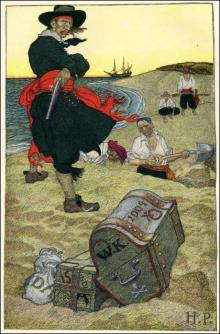 Howard Pyle's Book of Pirates
Howard Pyle's Book of Pirates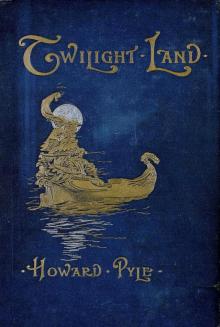 Twilight Land
Twilight Land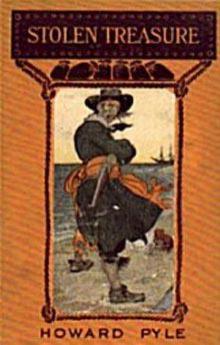 Stolen Treasure
Stolen Treasure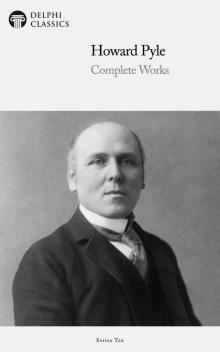 Complete Works of Howard Pyle
Complete Works of Howard Pyle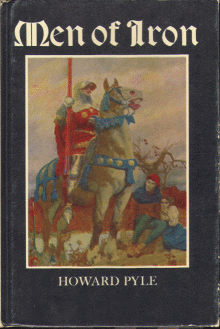 Men of Iron
Men of Iron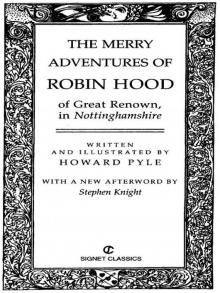 The Merry Adventures of Robin Hood
The Merry Adventures of Robin Hood The Wonder Clock
The Wonder Clock